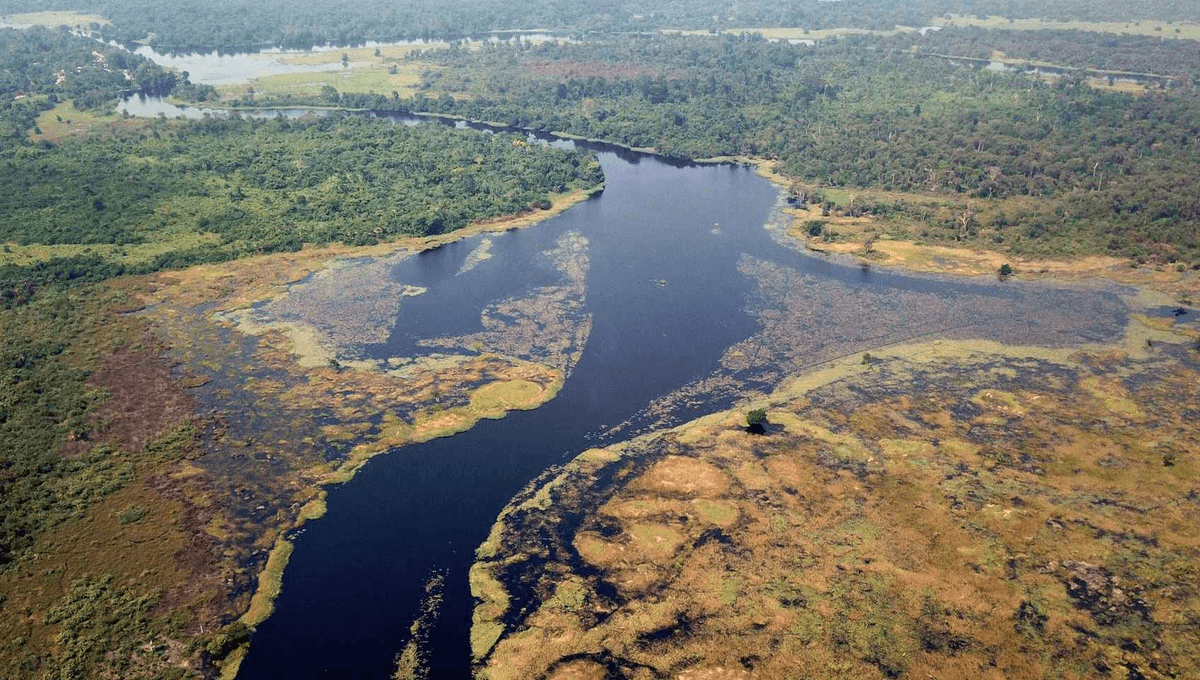
The Ruki River is half a kilometer (around a third of a mile) wide at its mouth and has an average discharge far greater than the Rhine, but few people outside Africa would even have heard of it. To those who live by its banks its color no doubt seems very normal, but researchers from ETH Zurich were astonished upon encountering it, and in exploring the reason for its intense darkness discovered its global significance.
“We were struck by the color of the river,” said Dr Travis Drake in a statement. Many rivers are dark enough to be called “blackwaters” and for some, it even gets into the name. One of the largest tributaries of the Amazon, and the fifth greatest river in the world by discharge, is called the Rio Negro because of the organic matter that darkens its waters. Yet even among these, the Ruki stands out.
Like other blackwater rivers, the Ruki gets its color from dissolved organic compounds (DOCs) in its waters. Ironic as it may seem, its lack of sediment also contributes. Although soil darkens a clear mountain stream, it’s seldom as black as the tropical forest matter that gives the Ruki its color. The Ruki runs through nearly flat territory, so it doesn’t scrape up much sediment.
On the other hand, the heavy rains in the area wash DOCs from plant material on the forest floor. During the rainy season, the same flatness causes large areas to flood, and remain underwater for weeks, leaching even more compounds out. “The Ruki is essentially jungle tea,” Drake said. When Joseph Conrad wrote Heart of Darkness about the Congo, he could have had the Ruki in mind.
Still, there are a great many other rivers that flow through tropical rainforests – all that rain must go somewhere – and many of them are also in flat terrain, including other Congo tributaries. Discovering there had been no scientific exploration of why the Ruki was darker than its counterparts, Drake and colleagues set out to fill the gap. They established a monitoring station to explore the river’s chemistry just above where it joins the Congo.
The region is among the poorest on Earth and Mdandaka, where the station was established, has no general electricity supply, despite being a city of more than a million people. Consequently, “Our measurement methods on site were quite basic,” Drake said.
Yet the team was able to measure (DOC) concentrations in the water, as well as the DOCs’ age to determine if any is coming from the peat bogs along the river’s banks. These bogs trap vast amounts of undecomposed plant matter. Currently, this makes the area a major carbon sink – but if carbon in these bogs were to escape, eventually reaching the atmosphere, it would become a major additional driver of global heating. The team’s radiocarbon dating indicates little of this is happening, however.
Drake and colleagues found the Ruki has four times as much DOC per liter as the river it joins, and 1.5 times as much as the Rio Negro. There’s a reason that underwater you can’t see your hand in front of your face.
That gives the river an oversized influence on the planet’s carbon budget. Currently, it’s wielding that great power responsibly. Although the river is rich in organic acids that can dissolve carbonates and release carbon dioxide, that does not happen to the degree feared. “CO2 emissions are relatively high across the Ruki’s entire drainage basin but not dissimilar to other tropical rivers,” Drake said. The river is placid and once saturated with carbon dioxide the gas can’t escape easily, preventing more from forming. “In a turbulent river, we’d see higher emissions,”.
Changes to the river basin such as increased agriculture could lower the river in the dry season, expose the peat bogs to the air for longer, or cause more turbulent flow during the wet.
Alterations to the Congo Basin in general could pose a grave threat to the planet, and this work indicates the Ruki is particularly crucial. Despite representing just 5 percent of the system by area and 9 percent by flow, it releases a fifth of the DOCs.
The study is published open access in the journal Limnology and Oceanography
Source Link: Why The Ruki May Be The World’s Darkest River